- Home
- Joseph Bruchac
March Toward the Thunder Page 2
March Toward the Thunder Read online
Page 2
Why’d it take so long for the Union to free the slaves? Why was there slavery in the first place?
Back in Canada slavery had long been outlawed. That was why the runaway Negroes headed there.
How can one man own another?
It made no sense. Nor did it make sense that so many white people in the “free states” still owned slaves. From what Louis heard, even General Grant’s wife owned a slave or two. Some said the war wasn’t about slavery but about the right of states to do what they pleased. That too didn’t make sense to Louis.
Am I too young to understand these things? He shook his head. I’ve only seen fifteen winters, but it seems to me that slavery’s what the battle ought be about.
A war to free the slaves—that touched his spirit. Louis had met some escaped slaves in Canada. They were dark-skinned men and women and children who traveled at night toward the winter land, following the star shape Louis knew as the Great Bear—though they called it the Drinking Gourd. They’d stop by the Nolette camp on the river and stay the night, grateful for the good vittles the serious-faced Indian boy (his skin only a shade lighter than theirs) and his gentle mother shared.
It wasn’t unusual that he and his mother helped those runaways. Most Indians didn’t hesitate to make a place by the fire for any fugitive who needed a bed for the night and a bite of food. After all, Abenakis knew what it was to run for their lives.
Before his great-grandparents came to Canada, they’d lived in Ndakinna, their old homeland now named Vermont and New Hampshire. If they hadn’t fled, they might have been killed like so many other Indians back then. Wave after wave of Englishmen swept in, washing over the hills, turning Native land into New England. Those English even turned some captured Indians into slaves—like those darker-skinned men and women they later brought from across the ocean.
Louis shook his head. He didn’t like thinking about such things—neither the bringing of slaves nor the sad day when their allies the French gave up their long war against the English and left the Indians on their own to fight or die, hide in the hills or retreat.
The thunder rumbled again, closer than it had been before.
“Sounds a bit like cannon fire, does it not, young fellow?” said a voice from his left.
CHAPTER TWO
THE RECRUITER
Saturday, April 2, 1864
Louis didn’t look up. He’d sensed the white man standing there, but had not acknowledged him. He didn’t look the sort who’d pay attention to a pair of basket sellers. He was far too well-dressed to be a farmer or even a merchant. Tall beaver hat and that silk vest, watch chain hanging out of it. With those polished boots and that cane in his hand, he seemed too full of himself to be buying a basket. But why else would he stoop to talk to a brown-skinned young man?
Unless a white man wanted to buy from you or hire you or you were in his way and he expected you to step aside, there was no reason for a gentleman dressed like a lawyer to take notice of an Indian boy.
His mother pointedly paid no attention to the man. She focused on their baskets, arranging them on the long pole. They didn’t have a sign out. The baskets were sign enough. Plus most of their customers knew them, seeing as how they were here five days a week. Folks had learned that a Nolette basket was woven tight and strong.
“A good basket can outlive the hand that made it,” his mother often said.
Ash is tough and it holds on, Louis thought, as we do.
You might pound on ash to raise the rings from the trunk and pull off the withes, but it stayed strong as sinew. A thin strip of ash could hold the weight of a man if you looped it over a limb.
The man cleared his throat.
“Good morning, young man,” he said. Something in the tone of his voice made Louis pay attention. The man wasn’t just being polite. He wanted something.
No need to talk when talking is not needed.
So his father, Jean, used to say. It was now Louis’s motto. Two fingers held up meant the basket cost twenty cents. A nod or a shake of the head was all that was needed to transact the sale after that. More than one person who bought from them went away thinking Louis and his mother spoke no English at all.
But this might be their first sale of the day. Saying something could make a difference. So Louis used his best English, not even a trace of a French accent in it.
“Good morning, sir,” he replied.
Only three words, but they earned Louis more than he’d bargained for.
“Ah,” the man said, showing his teeth in a broad grin that looked more hungry than friendly. “You speak English.”
“Yes, sir.”
“Excellent! I thought that might be so when I saw you studying that newspaper. You can read as well, can’t you?”
“I can,” Louis answered, his voice a little slower this time.
This conversation, where is it leading?
“So you have been following the fortunes of our valiant lads in this great War for Abolition, this Struggle Against Slavery.”
Louis’s mother was no longer arranging her baskets. She moved next to her son and grasped him by the elbow. He knew what that meant. But he ignored the touch on his arm that meant he should end this conversation.
“You could say that,” Louis replied. More words than needed. Why am I trying to prove that I speak English as well as a white man?
“Indeed.” The man’s smile was so broad now that you could count his teeth. It made Louis think of a picture he’d seen once in a book. A big-mouthed, sharp-toothed thing called a crocodile. “Might I ask what sort of work you do, lad?”
So that is what this is about. He is just looking to hire an able-bodied man.
“Mostly I’m a common laborer,” Louis said, beginning to feel relieved.
“Excellent! And how old might you be?”
The kind of question a stranger ought not to ask. His mother tugged at his arm again. But Louis saw no harm in answering. “Just turned fifteen, sir.”
The man looked disappointed. For half a heartbeat the crocodile smile slipped from his face. He stroked his broad chin with the long thumb of the skinny clawlike hand that held the cane.
“Fifteen, fifteen,” the man said in a musing tone. “But big enough.”
The grin reappeared as he turned his attention again to Louis. “Why, there’s young men half your size wearing the blue. You could pass for twenty.”
Louis shook his head. “I am not that old.”
“A mere technicality, lad. They’ll take you at your word, what with the losses they’ve . . .” The man paused. “I mean to say, what with the need of the brigade at present, seeing as how so many have served and are being allowed to go home now. Which is why I have been employed to assist the good Captain Forsythe in his efforts. But I am putting the cart ahead of the horse, eh?”
Louis tried to picture a wagon being pushed by a horse. It didn’t make a lick of sense. Then again, little of what this man with the big teeth had said amounted to anything that Louis could understand. But he kept his peace, even though he sensed the man was waiting for his reply.
Some men, they are great talkers. Keeping quiet, that encourages others to talk—maybe even more than if you say something. Why waste your breath asking a question when you can get the answer by holding your tongue?
“Ah,” the man said, trying another tack. “I see, my boy, that you are a thinker. Do you know what this war is really about? Our fight is to preserve the Union.”
If it is your fight, why are you not carrying a gun into battle? Why are you standing here and jawing at me?
The man saw that question in Louis’s eyes. “If I were a young lad like you, I’d be the first to sign up.” He sighed. “But alas, my health is too poor for me to serve in the ranks.” He hooked his long thumbs into his vest and took a deep breath. “I’ll put it to you plain, my boy. How would you like to strike a blow to preserve our beloved nation?”
Louis couldn’t keep himself from answering that
one. “It is not my nation, sir,” he said. “M’mere and me, we are from Canada. We are Indians.”
His mother, who’d been hovering over his shoulder, smiled at that. She turned back to her baskets, certain the conversation was now over.
To Louis’s surprise, though, the man in the tall hat didn’t look discouraged. If anything, the man’s reptilian grin did what Louis would have thought impossible a moment before—it actually got broader.
“Son,” the man said, placing a well-manicured hand on Louis’s shoulder, “let me get right to the point. Apart from patriotism to spur you on, there are further incentives. For one, you’d receive a fine new uniform, much better than those rough-spun clothes you are wearing now. Made of fine cloth, none of that shoddy material what was so callously handed out to our troops early on in the war. You’ll get new boots, as well. And your very own rifle will be issued, nothing less than a fine percussion muzzleloader, the Model 1861 Rifle Musket.”
At the talk of the uniform and the gun, Louis had started to take more notice, but the man was not yet finished. His best point was still to come—as the hand gesture he made, a bony finger lifted dramatically to point toward the sky, indicated. He leaned toward Louis, lowered his voice.
“Also,” the man whispered, “there’s the bounties. Not only a one-hundred-dollar federal enlistment bonus—payable on signing—but our grand state of New York’s offering a five-hundred -dollar bounty for first-time enlistees. Moreover, each solider will receive another seventy-five dollars at the end of the war, which will surely be soon. Then there’s regular pay, a generous sixteen dollars per month. Promptly delivered into your hands by the government paymaster. Plus there is a pension for being wounded. Not that there would be much chance of that. Picket duty is about all a man might expect now.”
“I will do it,” a voice said.
To Louis’s surprise, it was his own.
“I will join the army.”
His mother turned Louis toward her and looked up into his eyes. She saw it there, the stubborn determination. So much like his father. Marie Nolette sighed as only a mother can.
Now that her brave and foolish son had spoken those words, there was no turning back.
CHAPTER THREE
NEW BLOOD
Friday, April 15, 1864
“’Tis a fine motley bunch ye are,” the burly Irish sergeant growled as he walked down the line. “Not a man in the lot of ye worth the powder to blow ye to Kingdom Come. Straighten yer shoulders, lad!”
Louis tried to stand straighter, even though that comment was not meant for him but Private Merry to his left. Will Merry was not making much of a soldier thus far. He seemed determined, but didn’t appear to have the stamina of the other men. Not surprising considering his size. Little Will was so short and slender that he looked even younger than Louis’s own fifteen years.
Young as he was, Louis was taller, his shoulders broader than most of the other recruits. Several, like Merry, appeared to be under the legal age themselves. And though he’d discovered that he missed M’mere more than he’d expected, Louis was not one of those who cried out for his mama in his sleep—like the skinny farm boy behind him in the second rank, the one now nicknamed Possum.
What the other recruits had noticed, though, was the brown of his skin.
“You a mulatter or a Injun?”
He’d been asked that more than once after arriving at camp. Some spoke in a hostile tone, others seemed merely curious. To each he gave the same answer in a patient, neutral voice.
“Indian, Abenaki.”
By the second day, no one still wondered if he was a light-skinned Negro. Word had gone round that they had a real Indian in their ranks.
Some of the men tried rough attempts at humor with him.
“Wouldn’t you rather have a bow and arrer than that musket, Chief?”
“How come yer not wearin’ feathers?”
“Not going to scalp us all in our sleep, are you?”
Louis showed no anger or resentment, hiding how he felt with a calm face. He gave no answer to such teasing jibes. After a few days, when it became clear that no response would be forthcoming, the teasing stopped.
The platoon had been at attention for so long that the sun had moved a hand’s width higher in the early-morning sky. Louis’s fingers that held the rifle at his side had almost gone numb. He flexed them to bring some feeling back. Letting his rifle drop was almost as bad as disobeying an order. No telling what they’d do to you then. He sure as shooting did not want to get punished the way Bull Belaney, who stood to his immediate right, had been disciplined just yesterday.
Belaney was muscled like a blacksmith and as broad as Will Merry was thin. He was also as mean-tempered as fair-haired Merry was eager and innocent. Trying to cheat at cards had led to Bull Belaney’s punishment. When Merry objected that the big man had slipped a card from his boot, Bull knocked Merry down and lifted a foot to put the boot to him.
Sergeant Michael Flynn was nowhere to be seen until then.
Sergeant Flynn, he may be built like the bear, but he moves like the cat.
Belaney’s boot never descended. Flynn appeared so fast to separate Bull from his prey, the bulky sergeant had seemed to materialize from thin air. That should have ended the matter. But Belaney took a swing at Flynn. The punch never connected. Belaney found himself on the ground with the sergeant’s brogan wedged on the back of his neck.
“Ye think yerself t’ be a fighting rooster?” Flynn rumbled. “’Tis time yer wings was clipped, then.”
Belaney spent the afternoon propped against the flagpole, hands tied, a wedge of wood in his mouth, a stout stick under his bent knees. He was kept like that until the bugle call for supper.
Belaney’s bad attitude still remained, though. It showed itself so clearly that after less than a week in Camp Meagher every other recruit was steering clear of the man.
Trouble, it hangs around that one like a cloud.
Louis wondered why Bull Belaney had ever enlisted in the first place. Perhaps what some said about him was true—he was a bounty jumper. With so many greenbacks being offered now as enlistment bonuses to new recruits, a passel of scoundrels were making quick money by signing up under false names, collecting their bonuses, and then deserting to do it all again in another county.
But Sergeant Flynn, who accompanied them on the train from Troy all the way to Washington, marked Belaney from the start and kept a special eye on the man. He even followed whenever the man went to relieve himself.
Flynn, he has a way of looking into your eye and reading your mind.
Louis thought back to the first time he met Flynn. It was on the very day he enlisted.
Louis was nervous, but primed to repeat what Mr. Lemon told him to say. Lemon. That was the name of the lawyer in the tall hat who was also a state recruiting agent—justifying his claim to ten percent of the bounty paid to each recruit he brought in. Like a true attorney, he had ready answers for Louis’s questions.
“Eighteen?” Louis asked. “How can I say that? Me, I am three years shy of that. I cannot fit my mouth around a lie.”
“No need to worry, my boy,” Lemon assured him. “I have dealt with this, ah, issue before.”
He reached into his vest pocket with a magician-like flourish to produce another card slightly larger than the first one he’d shown Louis, that read George Lemon, Attorney at Law and Enlistment Agent. Unlike the first card, which had been quickly returned to Lemon’s pocket, that second card was left in Louis’s hand.
“Use this, my boy, and all will be well.”
“Are ye old enough t’ serve?” the recruiting officer looked across the table into Louis’s eyes.
Louis looked down.
Sergeant Michael Flynn, 69th New York Volunteers read the hand-lettered sign on the table.
“I am over eighteen,” Louis carefully replied.
A little smile came onto the sergeant’s face. “So,” he exclaimed, “it’s an hone
st one ye are, laddie? And ‘tis the absolute truth that yer now telling me?”
“Yes, sir,” Louis said, nodding his head.
“And wouldn’t it be unfair of me, then, t’ go on and ask if ye’ve not put some little piece of paper into yer shoe wit’ the number eighteen writ large upon it?” Flynn quickly raised his palm. “No, ye need not answer that. It’s just thinking out loud I am. We need all the new blood we can get and may God have mercy on our souls. Just sign yer name and welcome t’ the service of Uncle Sam as a soldier in what is left of the Sixty-ninth, the finest regiment in the grandest of all the brigades that have ever been a part of the blessed Union Army.”
“ORDER ARMS!”
The command woke Louis out of his reverie. Without thinking, he lifted his rifle and swung it in front of him so that it slapped into the palm of his left hand. All down the line, other members of the training squad did the same.
“Grand!” Sergeant Flynn shouted. “That’s better, lads. Yer looking almost like soldiers now. I swear by all the saints that when I get done with ye, ’tis soldiers ye all will be. Even you, Belaney—if that is yer name.”
Although he knew he had to keep his face expressionless, Louis almost smiled at that.
CHAPTER FOUR
BUGLES AND MUSKETS
Friday, April 29, 1864
“Oleohneh Ktsi Nwaskw, Merci Beaucoup Bon Dieu.” So Papa began the blessing before each of their meals, hands clasped together and head bowed. Then his father, his mother, and Louis would each raise a hand to touch forehead, chest, left shoulder and right, the sign of the cross where the Son of God suffered and died for all—even the Abenakis.
Those four points of the cross were also the four sacred directions, the dawn land that brings light to each new day, the summer land, the land of the sunset, and the winter land, whose white snows mark the wisdom of winter, just as white hairs crown the head of an elder. For every ritual of the Catholic Church, Louis had also learned from his parents some piece of the old wisdom, the way their ancestors understood the blessings and dangers of this world.

 Peacemaker
Peacemaker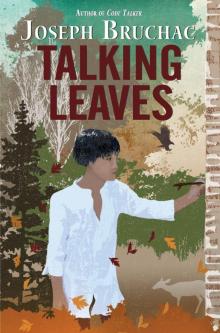 Talking Leaves
Talking Leaves Found
Found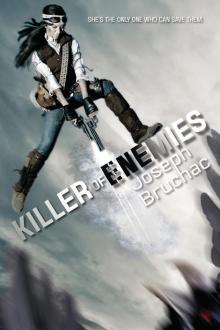 Killer of Enemies
Killer of Enemies Wabi
Wabi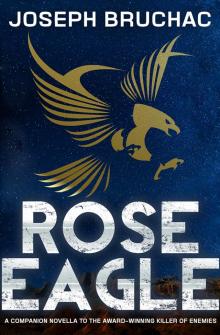 Rose Eagle
Rose Eagle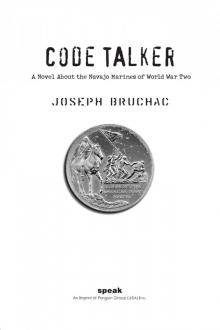 Code Talker
Code Talker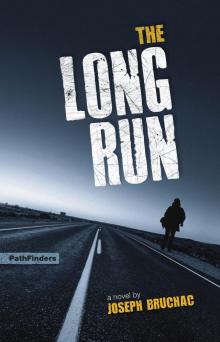 The Long Run
The Long Run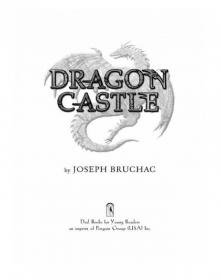 Dragon Castle
Dragon Castle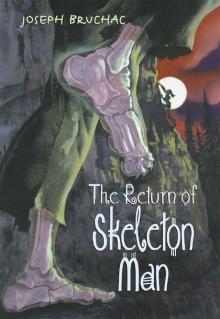 The Return of Skeleton Man
The Return of Skeleton Man Pocahontas
Pocahontas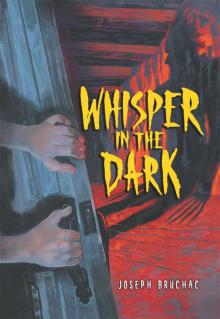 Whisper in the Dark
Whisper in the Dark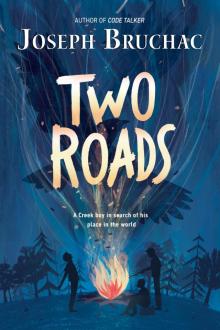 Two Roads
Two Roads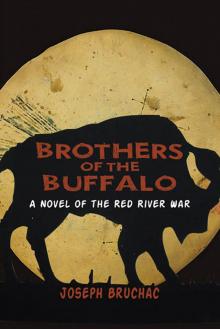 Brothers of the Buffalo
Brothers of the Buffalo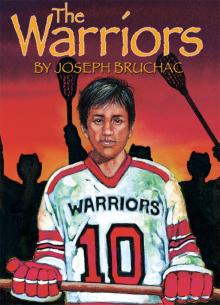 The Warriors
The Warriors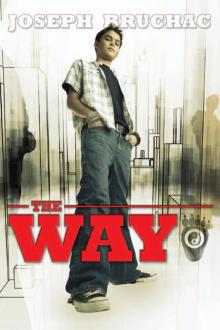 The Way
The Way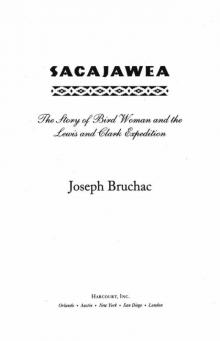 Sacajawea
Sacajawea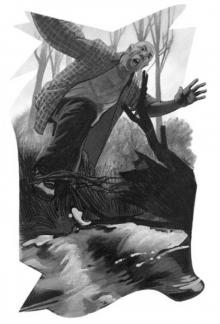 Night Wings
Night Wings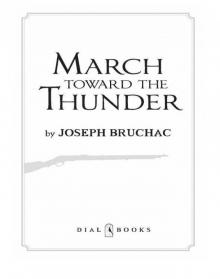 March Toward the Thunder
March Toward the Thunder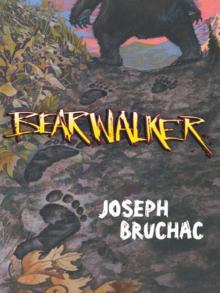 Bearwalker
Bearwalker Skeleton Man
Skeleton Man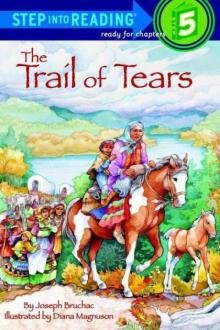 The Trail of Tears
The Trail of Tears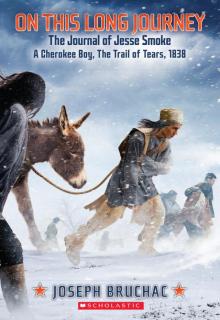 On This Long Journey
On This Long Journey Flying with the Eagle, Racing the Great Bear
Flying with the Eagle, Racing the Great Bear